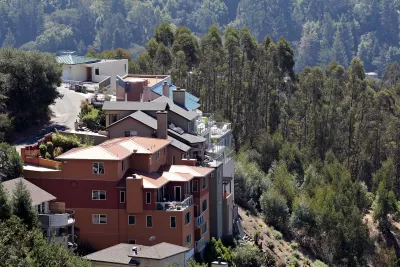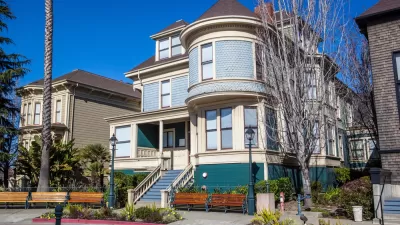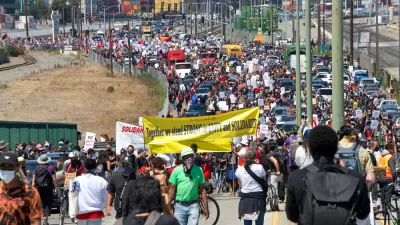The city has a plan to tackle its pothole problem that it says is equitable. But, some residents say it isn’t fair.

A three-year plan to repair decrepit streets throughout Oakland, California, was developed using an equity framework that would not leave out parts the city that have been neglected in the past. But residents in the city’s wealthier Oakland hills neighborhoods are not happy with the proposed distribution of $100 million of funds, which will provide bigger investments to lower-income areas in the flatlands, such as East Oakland and Fruitvale.
"The department weighed two factors equally to decide how to dole out the money: how many miles of poor roads lie in each zone, and how many households qualify as 'underserved' — meaning they are low-income, people of color, non-English speakers, elderly or young," reports Rachel Swan.
Oakland hills residents say that the vast majority of the funding comes from taxes they pay, and roads in their neighborhoods are dangerous and in need of repairs.
"Still, the urgency is greater in low-income neighborhoods, where the cost of fixing a popped tire or a broken axle could drain someone’s livelihood," says Swan. In addition, an analysis of streets in poor condition shows many more residents along each mile of roadway in East Oakland compared to streets in the North Oakland Hills.
FULL STORY: Oakland hills residents break an axle over city’s $100 million pothole plan

Maui's Vacation Rental Debate Turns Ugly
Verbal attacks, misinformation campaigns and fistfights plague a high-stakes debate to convert thousands of vacation rentals into long-term housing.

Planetizen Federal Action Tracker
A weekly monitor of how Trump’s orders and actions are impacting planners and planning in America.

San Francisco Suspends Traffic Calming Amidst Record Deaths
Citing “a challenging fiscal landscape,” the city will cease the program on the heels of 42 traffic deaths, including 24 pedestrians.

Adaptive Reuse Will Create Housing in a Suburban Texas Strip Mall
A developer is reimagining a strip mall property as a mixed-use complex with housing and retail.

Study: Anti-Homelessness Laws Don’t Work
Research shows that punitive measures that criminalized unhoused people don’t help reduce homelessness.

In U.S., Urban Gondolas Face Uphill Battle
Cities in Latin America and Europe have embraced aerial transitways — AKA gondolas — as sustainable, convenient urban transport, especially in tricky geographies. American cities have yet to catch up.
Urban Design for Planners 1: Software Tools
This six-course series explores essential urban design concepts using open source software and equips planners with the tools they need to participate fully in the urban design process.
Planning for Universal Design
Learn the tools for implementing Universal Design in planning regulations.
Heyer Gruel & Associates PA
JM Goldson LLC
Custer County Colorado
City of Camden Redevelopment Agency
City of Astoria
Transportation Research & Education Center (TREC) at Portland State University
Jefferson Parish Government
Camden Redevelopment Agency
City of Claremont





























